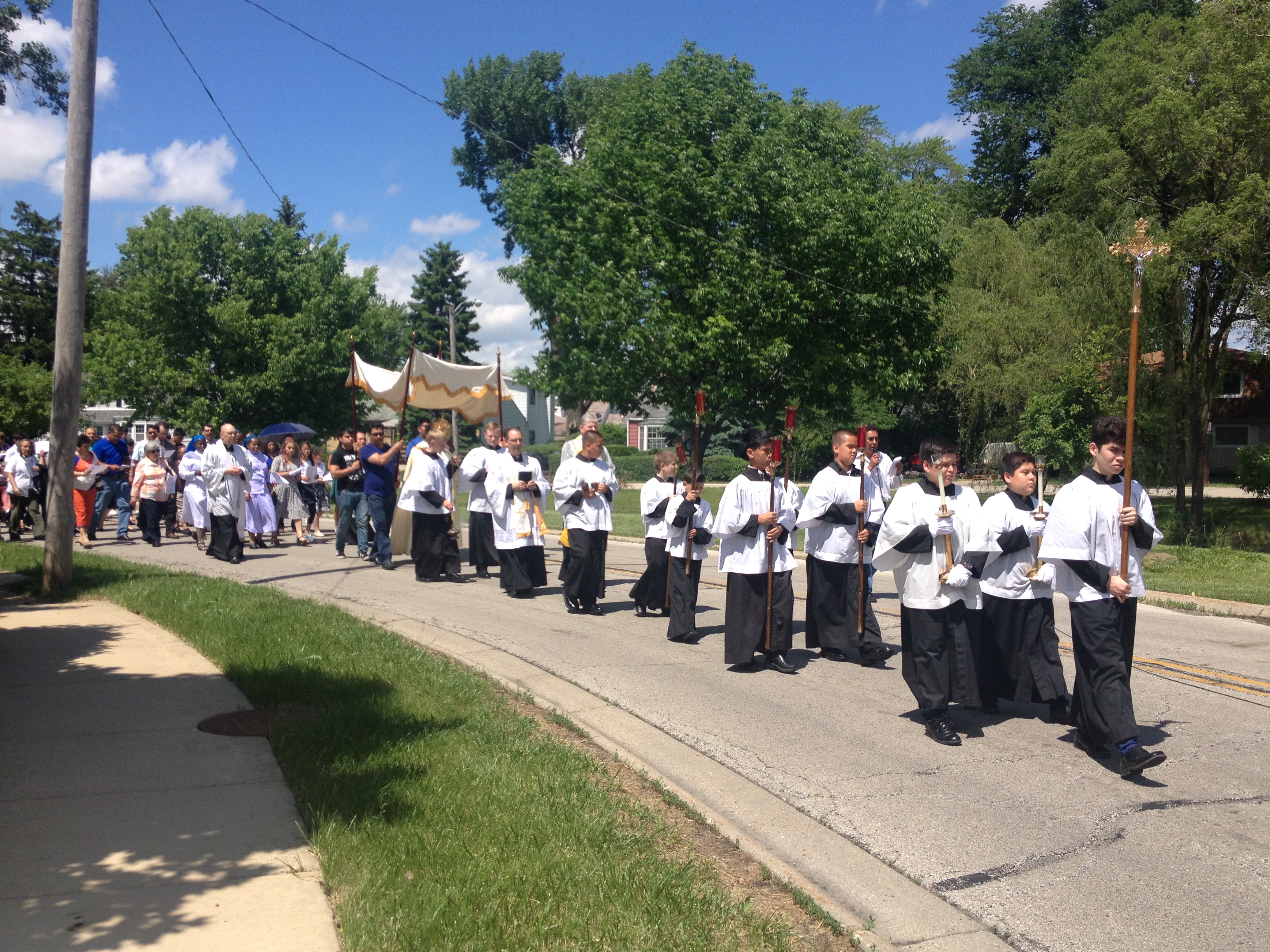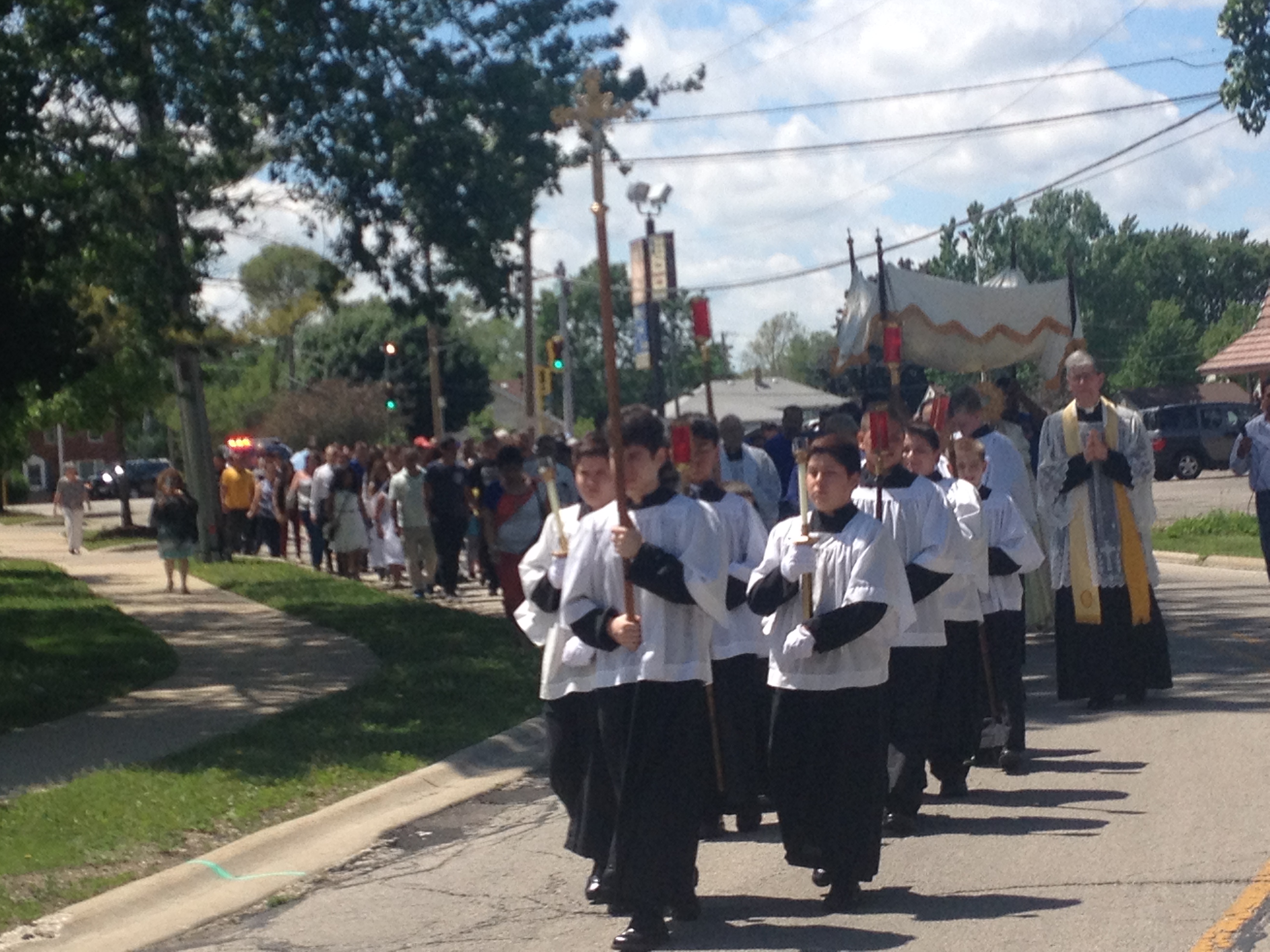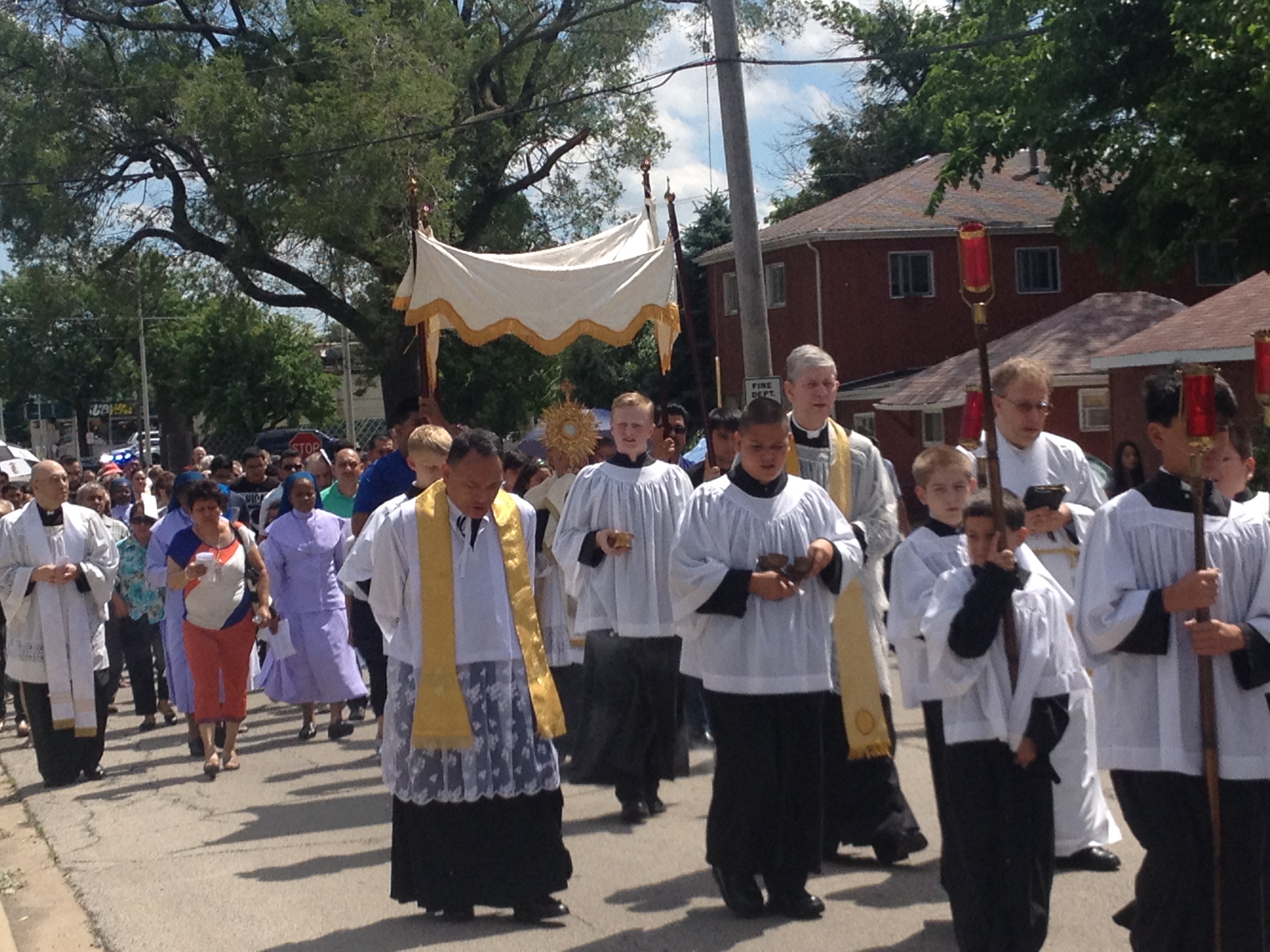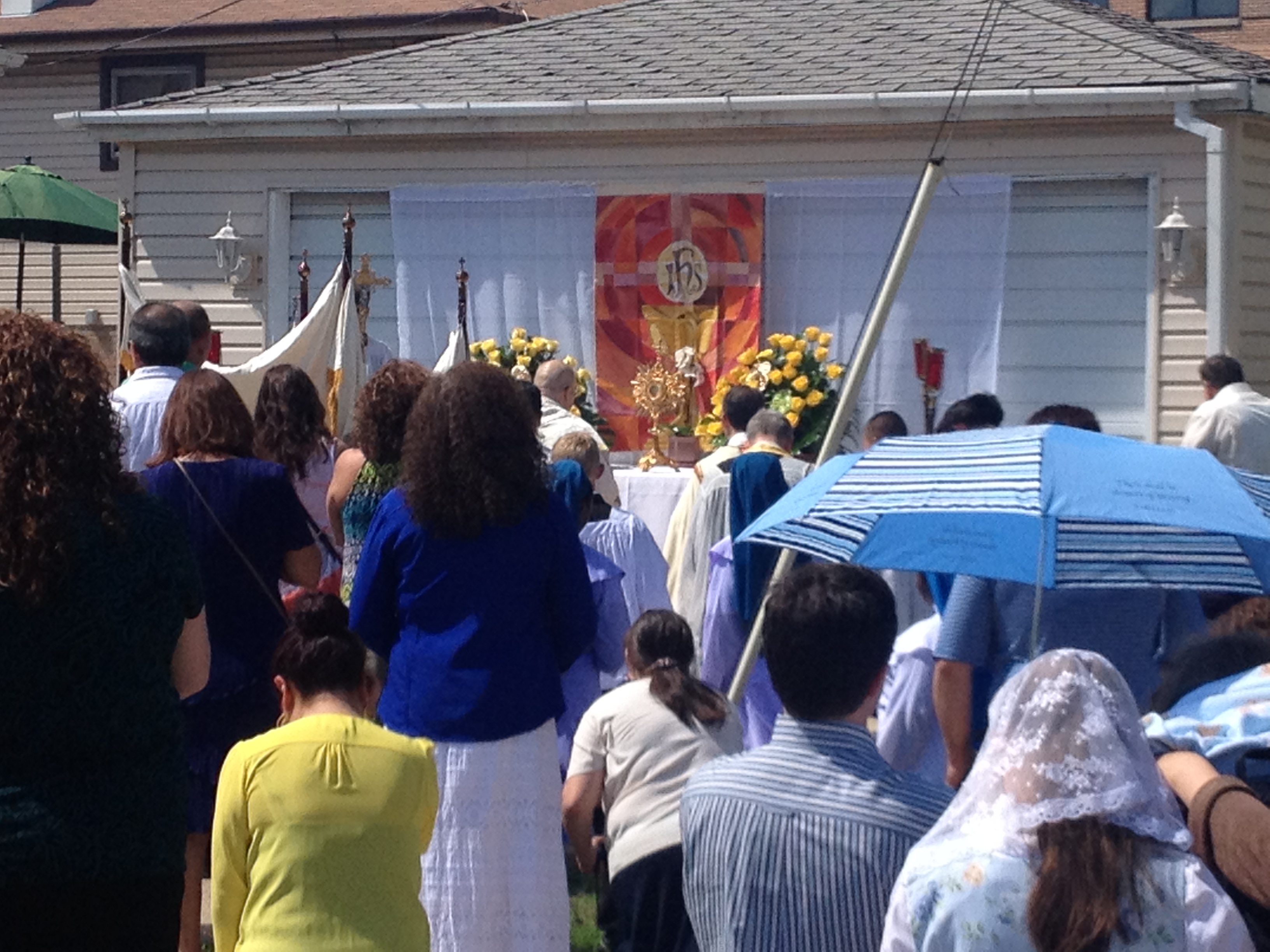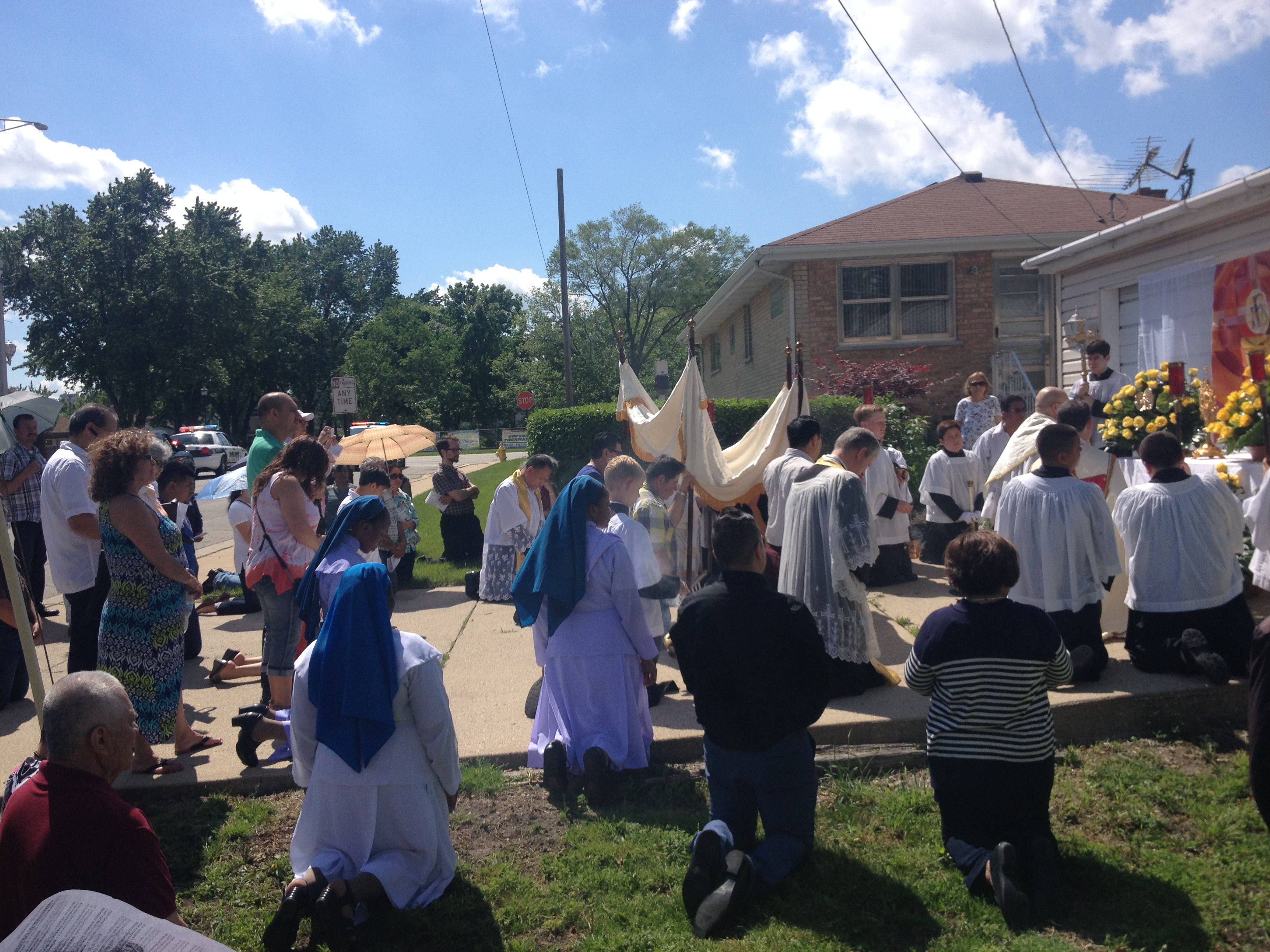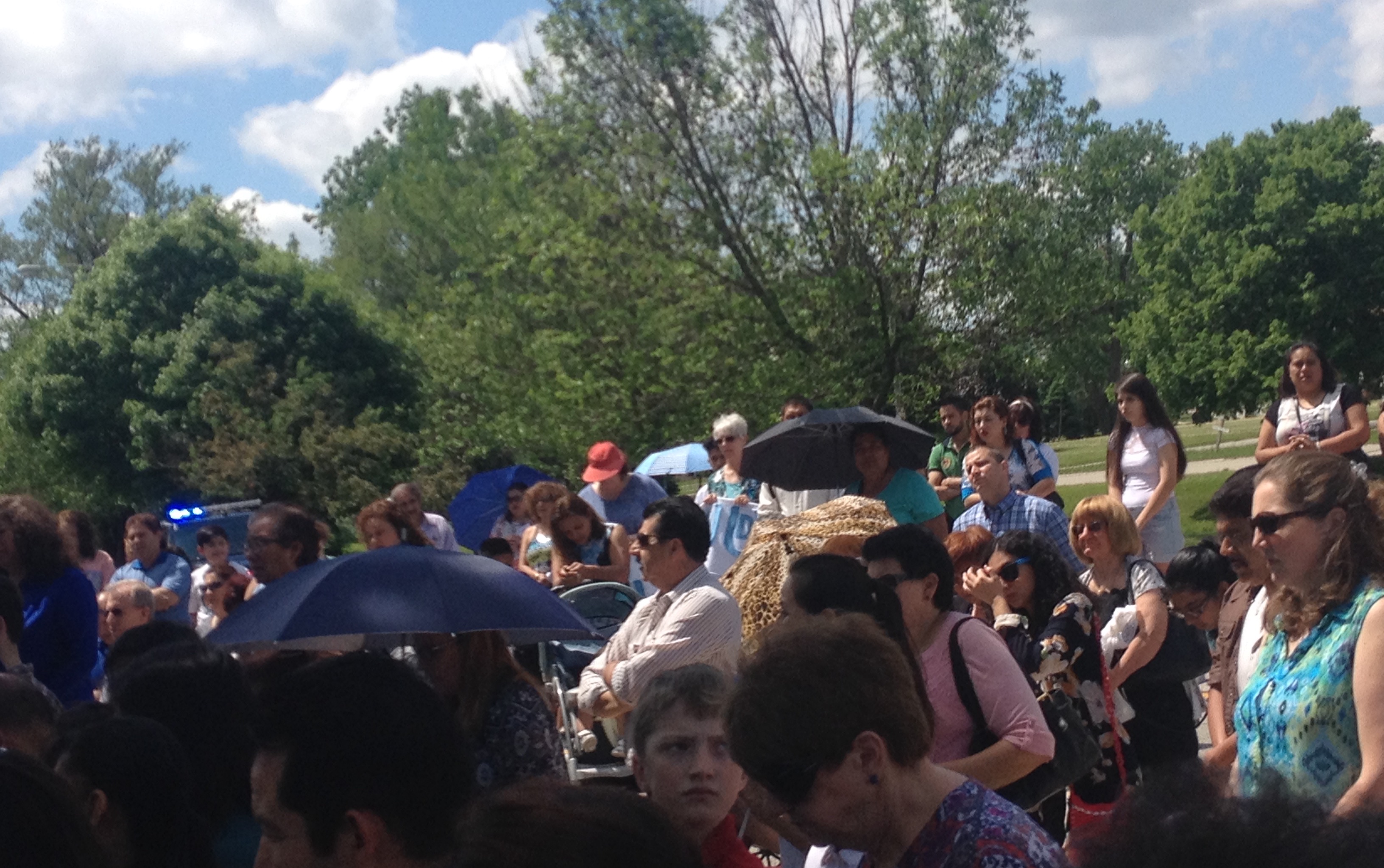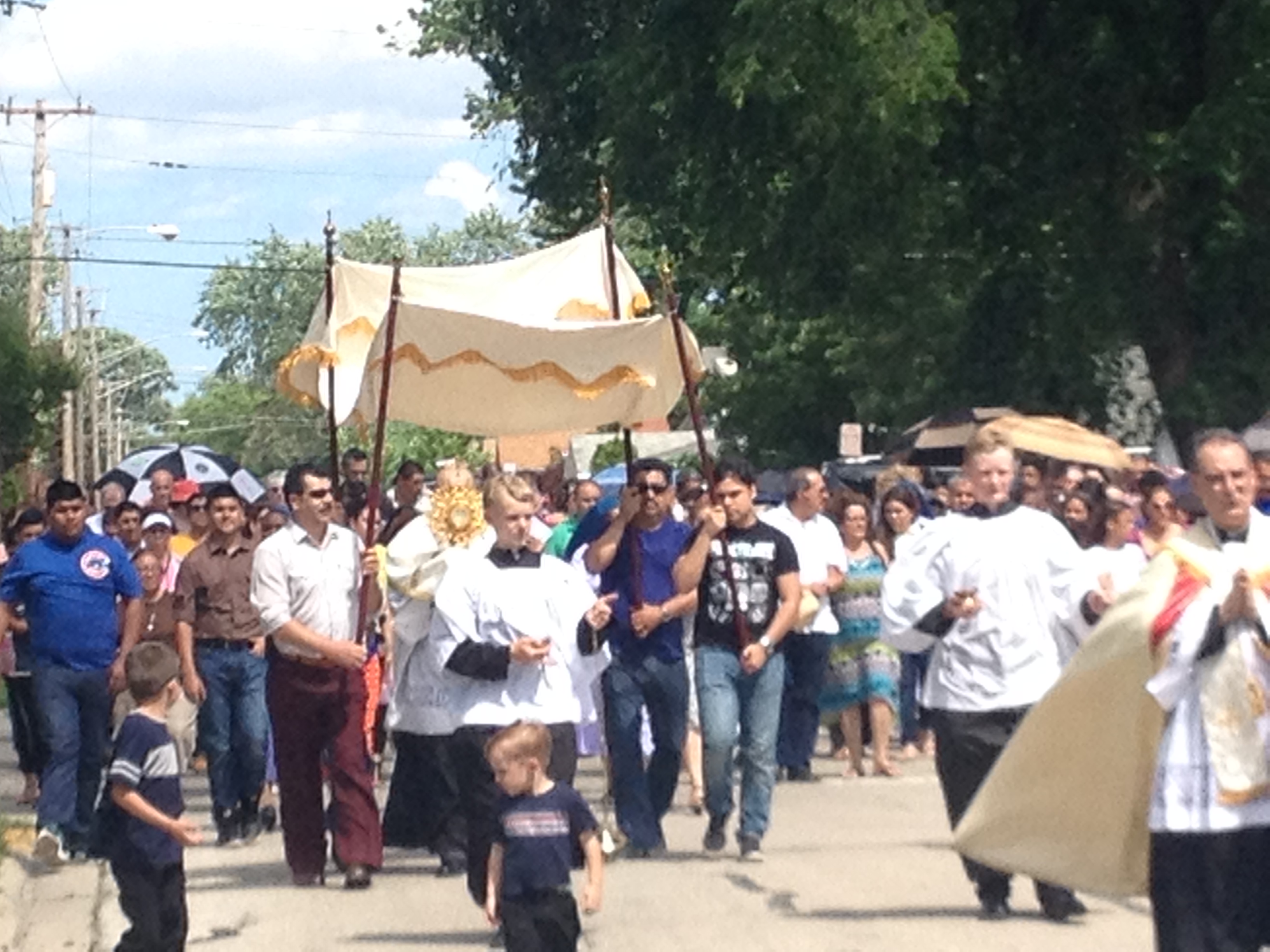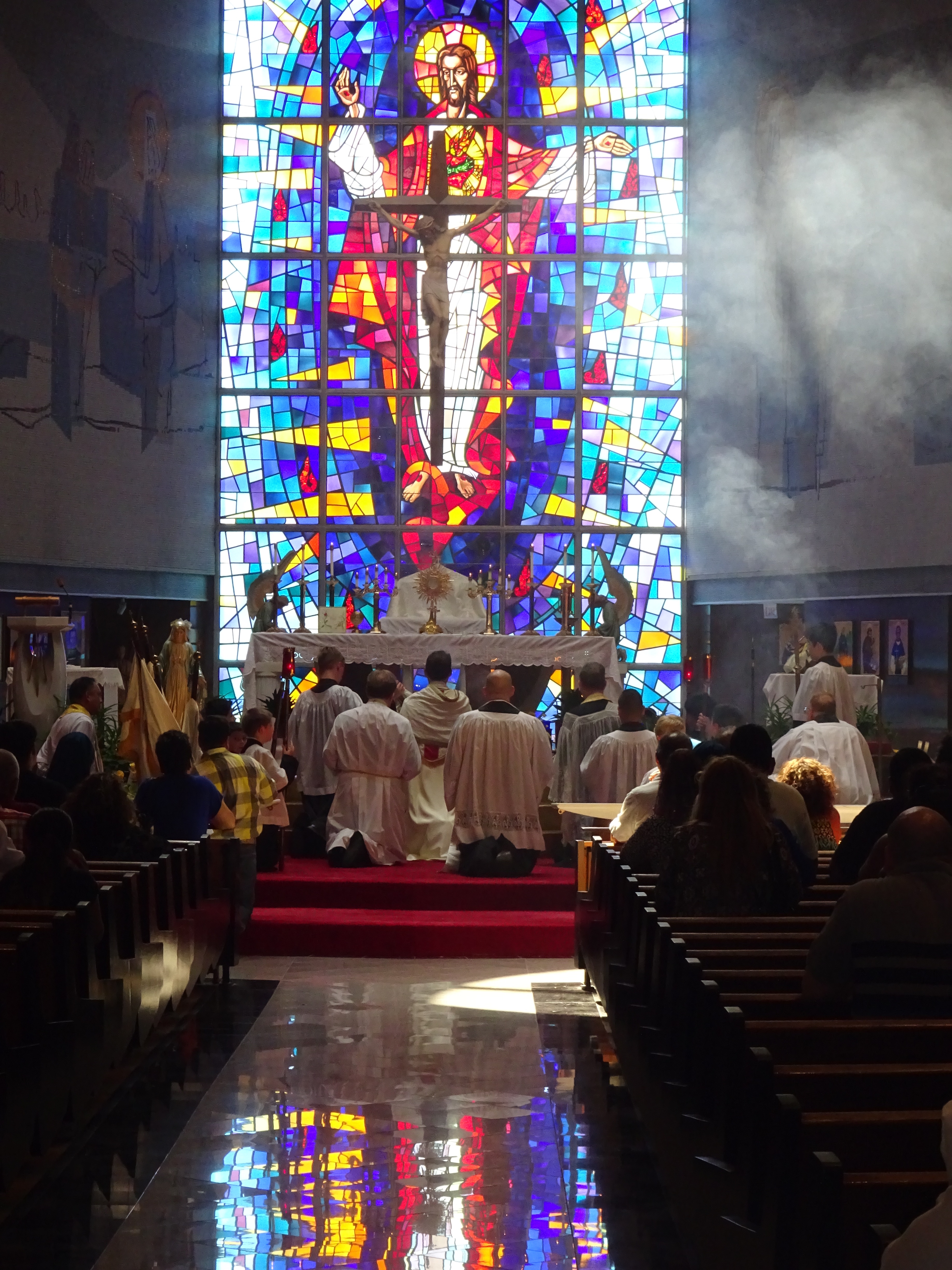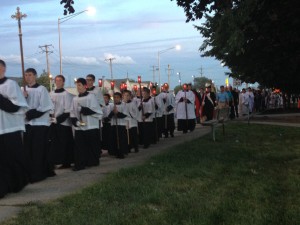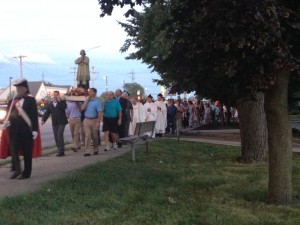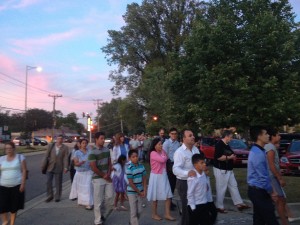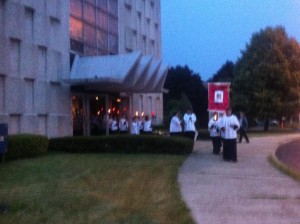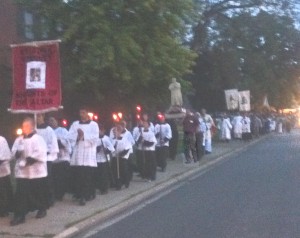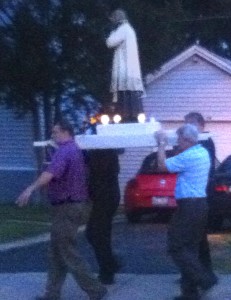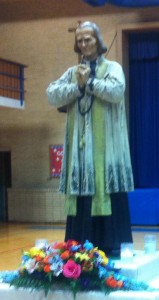“Whoever does not carry his own cross and come after me cannot be my disciple.”
Beloved in the Lord Jesus,
Today in the Gospel, Our Lord calls us to radical discipleship; he says it will involve the cross; To be a Catholic Christian is not for wimps, it is not always so popular a life, but it is a wonderful, free, and fulfilling life. Strange as it may seem, the wonderful life of a true Christian means encountering also – the cross. ‘Whoever does not carry his own cross and come after me cannot be my disciple.’ There are a lot of false Christianities floating around out there. People live a bourgeois lifestyle, the easy, spoiled life; they say that they are Catholics, but they follow whatever are the latest ideas. Some think of Christianity without the cross – they want an emotional experience of religion, or the comfort of religion, or the assurance of salvation – but they do not want the cross. It is ‘Christianity-lite.’ In many ways, they’ve returned to the Old Testament. The ancient Jews believed that if you live a good life and pray and love God, your business will thrive, you won’t have problems, you won’t suffer, bad things won’t happen to you; this is Old Testament thinking.
.
Jesus however says, to be my disciple you have to carry your cross, there will be crosses. The protestant world says that Jesus died on the cross so that we don’t have to do anything. But this is totally wrong! Jesus calls us to follow him and share in his life and offer our joys our sufferings our whole life to God – just like he did!
.
There is a rule in the Catholic Church, that wherever the Mass is offered, there must be a crucifix on or near the altar. The cross is important for us, not just because Jesus died on it, but because, as he says, we – each of us, must carry our cross and do our part. As a child, when difficulty came, mom would say to us: ‘Offer that up to God.’ Offer it up! We heard that a lot, we tried to offer hard things. This was the way that Catholics talked not long ago; I am wondering if we’ve lost this understanding, of being ‘other Christs’ on earth, offering our own crosses, uniting them with that of Jesus. This is really the heart of the Gospel; my mother knew it, many knew it – we must know this. St. Paul says, ‘We are heirs with Christ, heirs – if – We are heirs with Christ, – if – we suffer with him.
.
Here is from the Catechism: It says: Christ, in his incarnate divine person, has united himself to every person, offering them the possibility of being made partners in the paschal mystery (paraphrased from 618). And Pope John Paul said: Christ has raised human suffering to the level of the Redemption. Thus each person, in his suffering, can become a sharer in the redemptive suffering of Christ (Salvifici Doloris, 19). In other words: ‘Offer it up!’ Offer up your trials to God. Sometimes our cross is physical pain: a bad knee, a sore back, a serious illness. Sometimes our cross is an emotional one: anxiety, stress, or worry. A tragedy involving a relative or even a child. Sometimes our cross is spiritual: doubts, past sins and their consequences, dryness in prayer, guilt, despair, temptations.
.
At Our Lord’s Passion there were 3 crosses on that hill: One was a cross of rebellion – the bad thief, who wanted out of his suffering. Another was a cross of acceptance – the good thief, who did not choose his pain but he accepted it. The other cross was embraced – Jesus gave his all – all his suffering willingly, for us. We are glorifying God in our life and participating in the salvation of the world, of our family, of others – whenever we offer it up. For you, who are a spiritual person, I am only telling you what you already know, deep down in your heart. When that trial comes, when we are in great pain: ‘Lord, I offer this to you. I offer it for my daughter who is away from the Church. ‘I offer it for my past sins. I offer it for your glory, with Jesus, in his Passion. – Jesus!’ When we pick up the phone and that tragic news hits us – we don’t know if we can live through what has happened – Offer it up. ‘Oh Lord, O Jesus, Son of the Living God, help me to offer this, help me;’ we are on the cross, together. If you do not know the spiritual life at all, you will say that this is nonsense. But if you have that gift, you know what I am saying. There is a power that comes to earth unseen, when we Offer it Up. And even some children know this great Mystery, of how to offer trials; they are not far from the Kingdom of Heaven.
.
The opposite of offering it up and embracing our cross is self-pity, to have a ‘victim mentality,’ the ‘poor me’ A selfish-brooding over one’s own misfortunes. Self-pity puts a person at the center of their own little universe; they believe everything is against them, they’ve been dealt an unfair hand in life; they take themselves too seriously and exaggerate their difficulties. Here you find the melodramatic person who is not really interested in solutions for their troubles, they just want to tell you about them. The victim mentality craves attention, and projects misery in order to receive sympathy. It is an attitude full of ingratitude to God. But if you look at the saints, they hated the ‘victim thing.’ St. Teresa of Avila couldn’t stand to hear about ‘wallowing in self;’ St. Josemaria refused to hear of being victims. Mother Teresa said, sacrifices made with self-pity are worse than no sacrifices at all. She said: “There is a story of a little robin; he saw Jesus on the cross, saw the crown of thorns. The bird flew around and around until he found a way to remove a thorn, and in removing the thorn stuck himself. – Each of us should be like that bird,’ she said. Participating in the passion of Christ, and easing his pain. But more than the saints, Christ rejected self-pity: ‘Whoever does not take up his cross and follow me is not worthy of me.’
.
If we could really grasp the gospel, we would see that the cross in our life can be our glory. True story: A women lay dying in the hospital – a mother of 3 children. Outside the room in the hall, her priest was pacing and thinking of what he will say to her. The husband comes out and says, ‘Father, she wants to talk to you.’ the priest walked in, still trying to think of what he will say; as he sat down next to her the young woman looked at him with serenity: ‘Father, isn’t it wonderful – I am sharing in the sufferings of Christ.’ (He said, it was the most beautiful moment in his priesthood.) But Offering it Up does not only help those for whom we offer it. It helps us. If you want to talk to someone who is sympathetic, wise, patient, and loving, you have to find someone who has been through trials, who has suffered. Bees live on bitter food when making their honey, the best honey comes from the most bitter herbs. In the same way we produce great virtue and grow in holiness, by accepting bitter trials and offering them up.
.
The other secret is, that when we offer our pain or heartache, the trials strangely become bearable – no, actually meaningful, easier. St. Mary Magdalene de Pazzi said: Those who offer their sufferings to God soon find their pain to be very sweet, for as Jesus says: My yoke is easy and my burden light.
Let us conclude with the advice of St. Francis de sales: He says: ‘To be perfect, we must not only accept the cross that comes to us, but we must delight in it; not because we are weak, but for God’s greater glory. What I say may seem hard, he says, but believe me, when you put it into practice, it will be sweeter than honey. May the Blessed Virgin Mary be with us in our trials, and spur us on, to offer everything up, that we may truly be partners with Christ, in his salvific work. +
[Entrusted to the prayers of St Margaret of Cortona]
Beloved in Jesus Christ,
In 1863 during the Civil War, Union and Confederate armies converged on Chancellorville, Virginia. The Union Army was led by General Joseph Hooker. General Hooker had a reputation: he was proud, he was a braggart and a profane drinker with a temper; a godless man. As his army prepared for the battle, Hooker began to brag about how he would beat General Lee. ‘Let God have mercy on them, he said, for I will have no mercy. Then he made a statement which sent a shiver through the room: he pointed toward heaven and said: ‘Even Almighty God could not stop me from winning the victory tomorrow.’ That night, Officer (Winfield) Hancock, wrote a letter to his wife; he said: ‘how can we expect to win when we are under a commander who utters such blasphemy. General Hooker went to bed confident, but early in the morning he would receive the surprise of his life: General Lee attacked, catching him totally off guard. Hooker was stunned. he became paralyzed with fear and indecision, and nearly a whole day passed before he even came out of his tent to lead the battle. But it was too late; the southerners had pulled off one of the most spectacular flanking movements in history. It was a humiliating defeat. Hooker was immediately fired by President Lincoln; his pride had ended his career in total disgrace.
.
‘Whoever humbles himself with be exalted, says the Lord, and whoever exalts himself will be humbled.
Today we speak about the sin of Pride. Pride is one of the 7 Deadly Sins. Pride seems to have built into it, its own punishment. As scripture says, ‘Pride comes before the fall, and when pride comes, disgrace follows. Pride is the greatest danger to the soul. It is the sin of Lucifer, who said ‘I will not serve God.’ Pride was the sin of Adam and Eve who wanted to decide for themselves what is right and wrong; It is pride which causes some scholars to think they are above the teachings of the Church. ‘Professing themselves to be wise, they have become fools,’ says St. Paul. Pride is the self love that makes us think we are better than others.
.
Pride makes us seek our own glory apart from the glory of God; we see ourselves as the center of the universe and the judge of all morality. Pride wants to have its own way, and to control and dominate and manipulate. In the gospel today, we see the danger of those who wish to put themselves in the important place; it is very easy to look down on others, or to focus on the faults of others, so as to feel superior. In his book the Screwtape letters, C.S. Lewis shows how the devil wants us to pray for another person: the devil wants us, during our prayers, to list all the faults of the other person. ‘O Lord, help my friend who is arrogant; help my boss who is vain; help my brother who is a complainer’ – this is the goal of the devils: to keep our neighbor’s faults always in our mind, and to neutralize our own prayers, so that they aren’t even prayers at all. Pride is very sneaky. The more intelligent a person is, the more carefully their pride is concealed. Those who are very smart, will never fall into pride which is easily noticed, rather, their pride is subtle; it thrives – on clever words, certain tones of voice, and the manipulation of others. If we look closely, we will find some pride lurking in our hearts, often cleverly disguised.
.
As Father Bill Casey likes to say, if we think back on our life, we will see that our worst moments, our biggest failures, our most embarrassing falls, our bad behavior, the broken relationships – can usually be traced back to our foolish, foolish pride. Pride is the great destroyer of marriages, the barrier to holiness, the obstacle to confession, and the source of endless self deception as well as vanity. Pride leads to anger, it is an open door to the devil, the gateway to hell, and always a disaster in the making. Actions done out of pride lead to no good, and bring shame and regret. You know, after we’ve messed everything up because of our pride, so many times we say, ‘Oh Lord, I have messed up everything. It is my pride again.’
.
So how can we be cured? – Our pride can be conquered, only by humility. What is humility? St. Teresa of Avila says: humility is the virtue by which we have a correct opinion of ourselves and we see ourselves as God sees us. Humility is to see the truth of who and what we are before God. It reminds us that every good thing we have, every blessing and talent that we have, comes from God and not from ourselves. I love those athletes who point to heaven after a touchdown or a home run. Any good that we do, we should attribute to God and his blessings. In an old theology book, I saw a picture of two trees. One tree was ugly and the fruit on it was rotten sins: hate, envy, lust, arrogance. The other tree was beautiful, and its fruit was kindness, compassion, gentleness, gratitude, and charity. The roots of the ugly tree were in a soil by the name of – Pride. And the roots of the beautiful tree with all the virtues were in soil called – Humility.
.
Some people think that humility is to be very timid, or to put oneself down, or to have no initiative, but this is false humility. Some people, when asked to accept some responsibility say: ‘O, I’m not worthy of such a task.’ They think they are being humble, but often it is false humility concealing their cowardice or laziness. The humble person does not make himself the center of attention, or act like a know-it-all; the person who thinks they know-it-all never learns anything; but the humble person listens to what others have to say. A humble man can become very great, because he is willing to learn, and he is not afraid of making some mistakes or of what others will think. But pride shows itself in fear of failure, putting on sadness or faking illness to attract attention – fear of being under-appreciated, imagined insults, oversensitivity. —–
.
Sometimes we see the sins and failings of another person. We can be tempted to think that we are very superior. But if we think that our neighbor is nothing – that he is nothing more than a worthless cockroach in this world – then how God must laugh at us, because if our neighbor is a cockroach, then we are an ant, and how foolish is the insect who thinks he is something. Before the Greatness of Almighty God, we little human beings are really very much like each other. I often think that on the day of judgment, we may find ourself hanging desperately at the edge of heaven, slipping down toward hell by the weight of our sins. We cry out for help, and then a face appears above, to help us. And it is the face, of that person in life whom we had looked down upon: a neighbor, a spouse, the person whom we had considered a fool. And it is that person who offers his hand to us, to help me up and save me and embrace me. Then indeed would be that love, that Christ has wanted from us all along.
.
Some people will say that they are Catholics even though they are full of pride; maybe they are Catholics, but I don’t think they can be children of Mary. Devotion to the Blessed Virgin has a way of melting away self-love and pride. It is said that when the Son of God looked over the earth to find where he would be born, it was the sweet humility of Mary that drew him down from heaven. Mary, pray for us, to be more humble, that our actions and attitudes will show forth a beautiful humble life.
[Entrusted to the prayers of St. Thomas Aquinas]
Friends in the Risen Christ,
There’s a story from ancient times, of a young girl named Junia, who was curious about Christianity. Her best friend was recently put to death for her Faith. So Junia went secretly at night to the Catacombs, on the outskirts of Rome, to visit the tomb of her friend. At the door, the sentry met her – a tall Catholic man, about 20 years old. ‘I am not a Christian, she told him, but I would like to see Marcia’s tomb.’ The man looked around carefully to see if any spies had followed her, and then quietly brought her in. As they went down a narrow passageway she could hear people singing. The man told her, ‘They are offering Mass. As they walked, she saw a group of people kneeling, and a man lifting up a piece of bread. ‘This must be the Mass, she thought. Their guide, carrying a torch, led them down another passageway, and there she saw the tomb of her friend. Another young woman with them said: ‘She was a brave girl, and you too are brave Junia, for coming here tonight. She said this, because the Catholic Faith was illegal, and these were secret meetings. Junia asked her: Tell me more about your religion. ‘Well, said the woman, we follow Jesus in this life, and then we go to live with Him in heaven. Heaven is a wonderful place; that is where Marcia is now, and she prays for you. Junia asked her, ‘Why was Marcia always so happy?’ ‘It is because of Jesus,’ she said. The woman took the torch, and held it near a painting on the wall. It was of a young man, very handsome, and cheerful, and confident; he was holding a sheep on his shoulders. Junia’s heart leapt at the sight of this picture. Looking at the painting, she said, ‘Marcia was always so happy because she loved the Good Shepherd with her whole heart.’
.
Friends in Christ, From ancient times, Jesus has been described as the Good Shepherd. “I am the good shepherd, says the Lord. I lay down my life for my sheep.’ Catholics of old, in caves, and catacombs, drew pictures of Jesus, the Good Shepherd. In days of great persecution, why was this image of Christ so favored? Well, a shepherd must fight and defend his sheep. Against wolves, and wild animals, and thieves. Jesus Christ from his earliest youth, showed in his young face, one virtue perhaps over all the others. Confidence. The young Jesus held in his face, a certitude tempered with humility – such that to be with the Lord Jesus, was to never feel afraid. When he was before a hungry crowd of 5000, he said, give them food. – How? We’ve only got a few loaves and two fish! But with unwavering confidence, he said: ‘Bring them here. And he fed them all. When the man full of leprosy begged to be healed, in complete confidence Christ stretched forth his hand and touched him: I do will it, be thou made clean – and he was. The confidence, the fearlessness in the heart of Jesus, is a delight to the friends of Christ. This Shepherd of ours is not afraid of anything. He is not afraid of terrorists, he is not afraid of atheists, he is not afraid of secularists, he is not afraid of the devil. Jesus Christ is not afraid of the enemies of the past nor of those today. Today, many enemies do carry off his little sheep. Filthy television robs our teenager’s purity and modesty, and carries off these little lambs. And the wicked of the world, even lead moms and dads, to give up their prayers, and their religion, and their marriages; They are being carried off by wolves. Why? Because they do not ask the Shepherd to help them. They wander away from the Good Shepherd.
.
What is the most insidious thief of the children of God today? It is the voice of the world, growing ever louder, which says: You Catholics have to give in on some things. You Catholics are too old fashioned. Can’t you see the world is changing? Get with the times. What the world is saying, is that they have a better way to happiness. They say, your religion is bad for the world, it is divisive, it is too strict, your moral laws make people feel bad. But it was the same in the first centuries. It’s always the same.
.
The first Christians were told, you can have Christ, but you must also – worship the Roman gods; you must be a true member of our society and accept our ways. But they said no! ‘Oh, just throw a pinch of incense on the fire, to the gods – but they would not. Young women, old men – the martyrs were asked to do a small thing, to deny their Faith, but they would not. So they were fed to wild beasts, crucified, boiled alive, lit on fire, and every other test the pagans could dream up – but they would not deny the Faith. All that we are asked to do is to go along with the world on this idea or that; we only must say, ‘the church is wrong.’ But Holy Mother church is not wrong. She teaches truth which is the only path for a happy humanity. The martyrs said, they will not particpate in the orgies or the gladiator games of the then-dying pagan world. They said: ‘We will follow Jesus the Lord.’ St. Felicity sang to Jesus on her way to the wild beasts. St. Lawrence glowed with love of Christ, while roasted alive. St. Perpetua prayed in ecstasy while a dagger plunged into her neck. These are our brothers and sisters in the Lord. And each one of us, must be prepared to give up our friends, our reputation, or our life, for the Lord. In Sri Lanka, on Easter Sunday, a group of CCD children were told by their catechists: ‘it is Easter; Jesus died and rose for you, you must be ready to die for Jesus if necessary.’ And the children all agreed. Soon thereafter, ½ of them died from a bomb.
.
Oh, there are many traitors of Christ out there. Not just terrorists. Phony Catholics, who don’t agree with this or that teaching of the Faith. They want to twist the faith to fit in the modern world. But they are traitors. And they are on a path to destruction. Let us, every single one of us resolve never, ever, to compromise a single truth of the Faith of Jesus Christ. Let them kill us before we would betray this Good Shepherd, who loves us with his life.
O Mary, Queen of the Martyrs, help us to love our dear Savior who died and rose for us; help us to live for him, so that we may also die for him.
[Entrusted to the prayers of St. Elizabeth Ann Seton]
‘And he said to them, “Why are you troubled, and why do questions arise in your hearts? See my hands and my feet, that it is I myself.’
Friends in Christ, after his resurrection, Jesus appeared often to his disciples, and it is interesting, that in the first visits to them, he makes it a point to show them his hands and feet. He is showing them the wounds from his crucifixion. The resurrection of Christ is hope for us, because we are supposed to do what Jesus did: rise up on the last day in our own glorified bodies. But there is something else that we must do even before that great day: we must also endure wounds on our hands and feet – or at least, wounds in our life.
.
Suffering is part of this life, no one can deny that. There is much suffering in the world, it can even make people question their faith. Young people sometimes ask: ‘How can God allow suffering?’ ‘If God is all good and all powerful, why does he allow this to happen to me, or my brother, or my mother?’ ‘Why does he allow people to be tortured and persecuted?’ ‘Why is there cancer?’ This is one of the great questions. It is called ‘the problem of evil.’
.
Now contained in this question are two different types of evil. Physical evil and moral evil. Physical evil is: why does God allow cancer, or earthquakes; why does God allow a person to be attacked by a shark? These are causes of suffering which are due to nature. The other kind of evil is moral evil. Why does God allow a gang member to kill a child in the city, or a person to be treated cruelly in the work place, or a kid to be beaten up by bullies? These are ‘moral evils,’ they are caused directly by sin.
.
Atheists often bring up this question: They say: ‘The evil in the world proves there is no God. If God were all powerful and all good, he would not allow suffering.’ So what can we say about this? Well, first let’s say the small things, and then the big thing.
.
First, Free-Will: If God were going to stop the gang member from shooting, if he miraculously stopped the bullet in mid-air; or if, when the bully is going to throw the punch, his arm miraculously would freeze up and in this way, no one would be capable of ever hurting another, well, then we would really be robots controlled by God, there would no longer be free-will. God has given us a great gift: free-will. He wants us to use it to love, but unfortunately we use it sometimes to hate.
.
And every parent often feels this same frustration, seeing children use their free-will, not always for good things. They could lock them in a closet for their life, so that they would never get into any problems or get hurt, but that is not freedom. So much suffering and pain and broken hearts come about because we use our free-will to hurt others or ourselves.
.
God also allows the devil to exercise his free-will; the devil was the original source of all the moral evil, and the demons create enormous pain in the world by their temptations. So this is one reason that God allows moral evil: free-will. and we must say that he ALLOWS all this, but he does not desire it. It is his permissive will, not his active will. God suffers over the pain of the world, with us – we see that on the cross.
.
Another thing for us to consider, is that God can bring good out of evil; he is working on a much larger scale than we are. He can see the long-term effects of things. God is painting a masterpiece that extends over millions of years. If you put your face up close to a painting, you may say: ‘This black smudge is ugly, what a mistake.’ But backing away a distance, one can see that that black spot is an important part of the entire painting.
.
For example, a priest friend of mine was visiting a parish and after Mass, he saw a child in a wheel chair, deformed and serverely handicapped; he had a brief thought: ‘Why Lord?!’ Then he met the family after Mass. Great people. The older son was going to be a priest, a sister was going into social work, very kind and wonderful family. He thought: I think I know why – because of that child. We can sometimes see good that comes out of trouble.
.
God allows some people to be cruel, irritating, or unkind; but it is just these persons who allow another to be patient, serene, and long-suffering. How can we pray for our enemies unless we have some? For most of us to become a saint, there must be another person in our life – ‘to make us a saint,’ if you know what I mean!!
.
God also wants nature to be free. He allows cancer cells to grow in their own way, he allows sharks to do what sharks do and germs to do what germs do. The wind and seas move as they will; the earth’s crust shifts in a freedom all it’s own. For example, earthquakes – under the sea. In the 2004 Sunami, thousands of people died. This tragic event however produced an enormous amount of compassion and aid and generosity on the part of others. ‘But all those people died,’ you say. yes. But that isn’t the end of the story for them, is it? There is a next life. A man and woman were chatting in a barber shop in New York. The TV was on. They saw the devastation from the Sunami. The man shook his head. ‘Life is terrible.’ The woman said, ‘No, life is beautiful, but it’s full of pain.’
.
Mother Cabrini always saw suffering and obstacles as evidence that God was going to bring his blessings; when she and her young nuns were to stay their first night in the United States, in an old boarding house, one of the nuns turned down the blanket and screamed, ‘Look at that, they are crawling!’,she said. The sheets and blankets were alive with bedbugs. Mother Cabrini said: ‘My daughters, things like this will happen, but it is a sign that God is going to bless us.’
.
When she visited one of her missions, the sisters there told her: ‘Everything is wonderful here, no problems.’ She wrote in her notes: ‘I became worried about that mission, I wondered if God really was blessing it.’ Suffering, problems, obstacles – the Lord wishes to sanctify us through challenges.
.
So what can we say to the atheist about suffering? Let us ask: ‘If there is no God, then what? Then suffering is totally meaningless, then everything is meaningless; that means we are born, we suffer, and we die. that’s it. But that can’t be, we know there is meaning to life. This is why so many young people are in despair today, they don’t see God’s hand in the world. But he is here. St. Paul says: ‘We are heirs with Christ, provided that we suffer with him – that we may also be glorified with him.’
.
God has not totally explained the Mystery of suffering, but it is true that God himself has come into the world and has joined himself to our suffering. He didn’t take it away, but he has chosen to be IN all of our pain along with us, giving it meaning; our patience in suffering means that we are helping Jesus save the world, participating in his redemptive work.
.
When I was a seminarian, we had to attend some talks at a hospital. Other faiths were there too. One lady was giving a talk, and at one point she told us about a woman with cancer, who refused pain medicine, because she ‘wanted to offer her pain up for her family.’ She had a scowl on her face. The protestant seminarians and clergy laughed and said ‘it’s foolish, she must be convinced to take the pain medicine.’ But we Catholics did not laugh; that lady who was offering her suffering was probably a saint, another Christ, bringing down graces for her family. She got it. She understood suffering and it’s redeeming value.
.
God has not taken away suffering, but he has joined into it, with us. In heaven, when the meaning of all things is revealed, after the pain of this life – we will finally see the end of the story. In the end of the story, we will be resurrected with the Lord, and the sufferings of our life that we patiently endured will be the great glories of our life. May the blessed Virgin assist us in all the trials of life, that we may see her glorious face with Jesus, in heaven. Amen.
[Entrusted to the prayers of St. Joseph]
Our Novena is beginning, leading up to the feast of our holy patron, St. John Vianney. Let us seek his help and prayers, that the Lord would grant us our requests and our needs.
.
JULY 29: TRUE LOVE OF NEIGHBOR
Saint John Marie Baptist Vianney because of your love of God you showed great charity towards your neighbor. You could not preach on the Love of God without burning tears of love. During your last years, it seemed as though you could not talk about any thing else or live for anything else. Thus you sacrificed yourself to your neighbor by consoling, absolving and sanctifying them to the limits of your strength.
Your charity inspires me to greater love of God, a love which is shown more by acts then by words. Help me to love my neighbor generously as Christ loves them.
Holy Priest of Ars, I have confidence in your intercession. Pray for me during this novena especially for …
It is time for my annual summer Course for Priests – the ‘tune-up’ that we all need, spiritually, intellectually, physically. It’s one of the benefits of belonging to the Priestly Society of the Holy Cross: they keep you ‘on track’!

This year we are at this very old home made into a retreat house in California
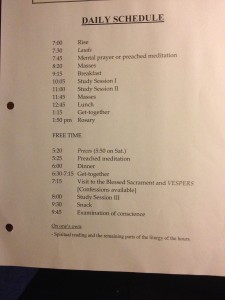
Here is our daily schedule


On our excursion day, I hope to climb that mountain!
Friends in the Lord, Today is Labor Day, and at a time when many suffer from unemployment and worry, let us consider today a few things about work.
.
For the world, work is about producing things, the end-result is all that matters. But for we Christians, we look at work in a much different way. Work is the means during our day, by which we offer praise to God. In fact we should praise God in all our activities: in rising, dressing, cooking, playing, and in – working.
.
Work is such a part of us, that we often identify our very self with our work. I am a mechanic. I am a nurse. I am a homemaker, we say. It’s often a large expression of ourself. For this reason, if we feel little valued at work, we are sad. If we lose our job, we take it personally. Sometimes too personally. But work is important to us.
.
Fr. Francis Fernandez says,[i] ‘we win heaven by our ordinary work.’
.
Jesus spent 30 years of his life working, and nothing is written about it. We too, with Christ living in us, offer our daily work to God, and so to that end, we should do only honest forms of work, and do it with the greatest perfection possible.
.
Human work done in this manner, no matter how humble or insignificant it may seem, helps to shape the world in a Christian way.
.
Enduring with patience those demanding customers; at the job site, returning anger with a kind word – Every act of goodness that we do and offer, especially the hard ones, makes our work holy, and brings supernatural grace to daily life.
.
The most mundane tasks offered to God, suddenly become valuable. A man cutting grass may decide that the front lawn he will offer for his son, who is going through a difficult time. And so the man cuts the front yard with perfection. Grace is brought down to his son, and to himself. And his work is not done with boredom, but with love.
.
Even the unemployed man should rise on time, and map out a day of work for himself. His main work: looking for a job. Sometimes children come to know their father best when he is out of work, because he has a little more time. All of these daily offerings are ultimately brought here, to Mass, to be offered to our Father.
For Christians, work is not just about results, because work is OUR way, by which we praise God.
[i] In Conversation with God, Vol 1, p. 344. Info in this homily is from here.
